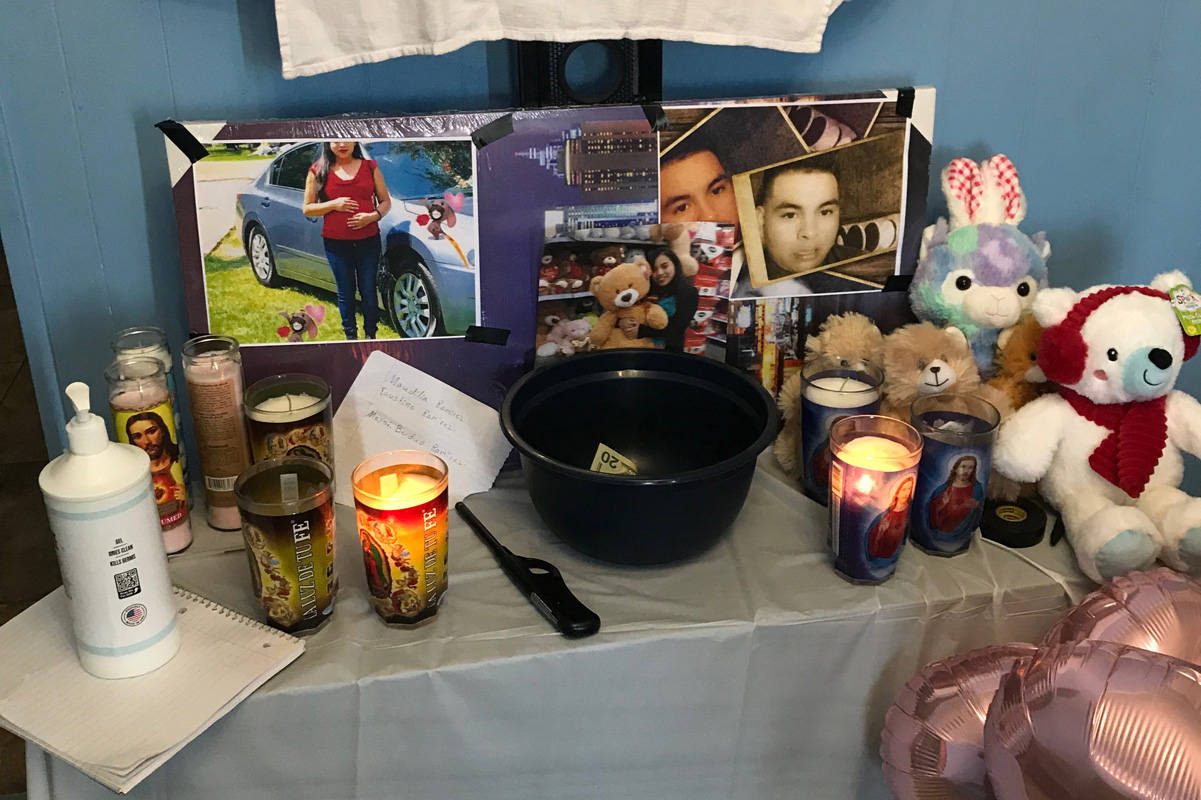Pain and the agony of loss came to a home on Chestnut Alley in Canton, Miss., as those who loved victims of a massacre there came together to mourn. For nine days after murder struck the home on Dec. 29, 2020, mourners met at the house to pray daily as part of novena, a Catholic ceremony in Guatemala after someone dies.
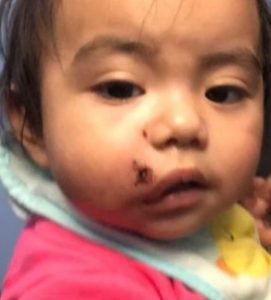
As mourners gathered, they set up an altar with photos of the murdered brother and sister, Jesus Christ candles, teddy bears and a small container where people left money to send their bodies back to their family in Guatemala.
The still-unsolved shooting left Faustino Ramírez, 20, and his sister Martina Ramírez, 19, dead, as well as her unborn child. She was eight months pregnant. Her one-year-old toddler girl was shot in the face, but survived.
But the mourners and the Hispanic community felt more than the pain of loss. The bloody murders of three Guatemalans in the house in Canton is fueling long-standing anger among this population who feel they are victims of frequent robberies and assaults in the community.
They want answers, which haven’t come.
Young Adults Had Recently Moved to House
The Ramírez siblings were minors when they arrived in the United States from San Marcos in western Guatemala. “They worked growing and picking coffee in the mountains that surround their town, and here in Mississippi they worked in chicken plants, and in construction,” their uncle Julio Moreno, who asked that his name be changed, told the Mississippi Free Press.

Faustino, the oldest of the Ramírez siblings, was the first to make the journey from Guatemala through Mexico to reach the U.S. at the age of 15. Faustino crossed the border and first went to New Jersey where he lived for four years, just traveling to Canton a year ago to meet family there, Moreno said.
Martina, the second of nine siblings, arrived at the U.S. border from Guatemala in 2017 when she was 16 years old. She turned herself in to immigration authorities and started a process for asylum in which Moreno, her uncle, took responsibility for her. Moreno offered the Ramírez siblings their own house to live in, and tried to help them as much as he could, but did not see what was coming the day the siblings announced they would be leaving their home to become independent.
“They said that they were already of legal age so they were going to choose where to live,” the distressed uncle recalled. “It didn’t mean anything bad. On the contrary, they had grown up and wanted to take responsibility for themselves.”
Shortly after the announcement, the Ramírez siblings moved into a house just a five-minute drive from their uncle’s house in downtown Canton. David, another Ramírez sibling, who is 15, came to Canton to live with them and was at the house the night of the murders, but hid during the attack.
Happy Reunion Turns Into Tragedy
Two months before the murders, the three Ramírez siblings had rented the house on Chestnut Alley in Canton. It seemed to be a happy reunion for the family after several years of being apart. They hoped to have a Christmas as merry as the ones they remembered from Guatemala.
Their happier days ended on Dec. 29 at 1 in the morning. Ramírez siblings were sleeping when a person broke into their home. He entered through the back of the house unnoticed, their uncle said.
“The intruder tried to open the first room he found, where Faustino and David were, but he found it secured, so he kept walking to the end of the hallway where Martina’s room was,” Moreno said.
Apparently, Martina was under the covers hugging her one-year-old daughter when that person invaded her room and shot them mercilessly.
“Two shots were fired, one at Martina and the other apparently at the little girl. Faustino left his room and on the way to Martina’s room, he ran into the murderer who also shot him to kill. In total there were four shots that night,” the uncle said.
Little Girl Survived, Staying with Relatives
Screams of his sister warned 15-year-old David Ramírez that something terrible was happening inside his house. Then the roar of gunfire scared him, and he jumped into the closet in his bedroom.
David heard a person who could be the murderer screaming and talking, but due to his language limitations, he did not understand what he said. It took five minutes for the killer to leave the house after massacring the boy’s loved ones.
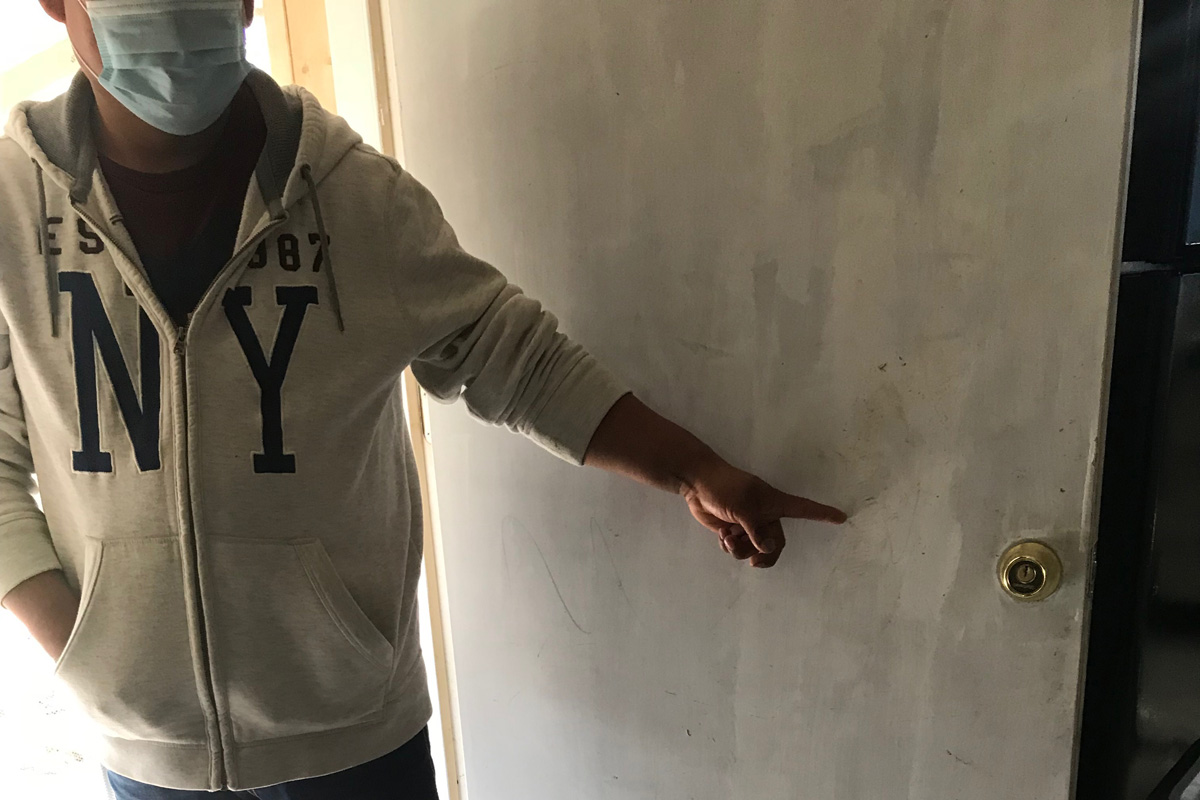
When David came out of his hiding place, he found the bodies shot and lying on the floor and bed. Just the toddler who has not learned to speak yet survived the attack. “The girl received a shot in the right cheek. Now she is fine at home with some family members,” Canton Police Chief Otha Brown said.
Relatives say that when David saw the little girl, she was not even crying, but undaunted, as she looked at what had been done to her mother.
Marcela Jiménez (name changed) lives in Canton and knew the siblings. She said that given David’s lack of English, he could not call 911 to report the triple homicide. The young man called a relative who spoke his dialect. “In five minutes, he arrived at the house, and then they called 911,” Jiménez said.
Relatives, friends and acquaintances of the Ramírez family came to the scene, terrified of being victims, too. Police and forensics took fingerprints, collected evidence and left with the three dead bodies.
Some relatives of the deceased complained about a delay in the arrival of the police and the ambulance at the scene of the massacre. Chief Brown told the Mississippi Free Press that for now he cannot speak about these allegations.
Fear of Constant Robbers and Assaults
The massacre shocked a Hispanic community frustrated with being victims of constant robberies and assaults in Canton.
Father Mike O’Brien of the Catholic Church of the Sacred Heart in Canton told the Mississippi Free Press that the last two years Hispanic members of his parish in Canton have suffered three or four shootings. “The Ramírez siblings were killed, but there were other Latinos badly wounded after being robbed,” Father O’Brien said.

A neighbor of the Ramírez family, Karla Medina (name changed), explained that there are different levels among Latinos who are victims. “The most affected among Hispanics are Guatemalans, because they are small, defenseless and easy to intimidate. Some Americans make fun of them on their face because they don’t understand English. That really makes me angry!”
She remembers many aggressions against Guatemalans that they did not report because most of them are undocumented, and they believe that they can get in trouble with immigration authorities. “Other times, something is not achieved by reporting to the authorities. I remember when young African Americans shot a Guatemalan teenager in the abdomen during a robbery. The Hispanic survived, filed the complaint, and they never solved anything,” Medina said.
Ramírez’ uncle, who is also from Guatemala, said that recently three men wanted to invade his home but changed their minds when listening to his dog barking. “I was watching them without them noticing I was. … When the dog barked, they said: ‘Shit! They have a big dog!’ and they left.”
Thefts in this area of downtown Canton are frequent, according to Moreno, who remembers that the house where the murder of his nephews took place was robbed months ago, when other people were the tenants.

“That house has been robbed twice. The first time the thieves entered and took computers, tablets and televisions,” he said. “Those who lived there at that time left the house for a moment, and when they returned to it, the thieves had already left with everything. That time, they didn’t hurt anyone.”
The Language Barrier
Marcela Jiménez knows the Hispanic population of Canton very well as she owns an employment agency that helps many find work. She says most Guatemalans began to settle in Canton because of the proximity of the town to the chicken plants where many of them work, and also because the rent of houses in this place is cheaper than in other places of Mississippi.
“A lady from Guatemala who came here to look for work in the past few days told me that a couple of teenagers stole her purse when she was walking down the street in downtown Canton,” she said. “Some Guatemalans say that this happens because police do not protect them very well.”
The Mississippi Free Press asked the Canton police for a response to this perception of insecurity by the Hispanic community, but the police declined to comment.
Jimenez points to misunderstandings between the police and Guatemalans that arise because of the language.
“Many Hispanics do not speak enough English to communicate with the police. To solve this, it would be very good if they brought policemen who speak Spanish,” Jiménez said.
About this situation, Father O’Brien said a group of people was formed a few days ago who are trying to find a way to make Canton’s Hispanics live safer. This group is made up of local authorities, Latinos and their parish.
Faustino Was Going to New Jersey
Jiménez knew the siblings and remembers that they were respectful and discreet people as are almost all Guatemalans living in Canton. “Faustino wanted to go back to New Jersey, so a few days before he was assassinated he had quit his construction job to follow his dreams,” she said. “I guess he had money to make his trip, and the killer knew it,” she said.
Canton Police Chief Brown confirmed that a robbery was committed on the night of the massacre. “We are still trying to find out the real reason, but money was taken when the murders took place. … I don’t know how much,” he said.
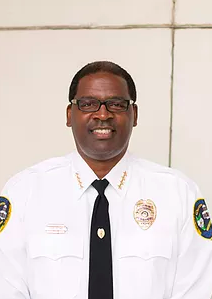
The family told the Mississippi Free Press that Faustino had between $2,000 and $3,000 in the house that night.
Perhaps the tragedy could have been prevented if Faustino had kept his money in a bank, but many Guatemalans do not have bank accounts. Most undocumented immigrants from Guatemala come from poor families who do not use the bank, because they never have money to save.
“It is hard for Guatemalans to get used to opening checking accounts because in their countries the money they make is only enough to fulfill their daily duties,” Moreno said. “When they arrive in the U.S., although they earn more money, many of them keep their distance from the bank.”
Moreno does have a bank account and advises all of his compatriots to open one. “In some banks, Guatemalans only need to show their passport to have checking accounts approved. Even if they are illegal (immigrants), it is very easy,” the uncle said.
Chief Brown told Mississippi Free Press that the Canton Police is trying to solve the case, including gathering testimonies from neighbors and working with the help of the Madison Sheriff’s Department.
Siblings’ Bodies Returning Home to Guatemala
As the investigation continues, the family of the Ramírez siblings are trying to make sense of the tragedy and bring closure to the family. Before they could perform the novena at home, they first had to clean the house.

“After they did their work, the police told us that we could stay at the house if we wanted,” Moreno said. “Nobody wanted to, but before we left we were forced to clean up the blood and fix everything to start praying the next day for the murdered.”
Now, the priority is to get the bodies back home to family in Guatemala. “Ramírez´s parents want to see their children’s bodies,” Moreno said. “What we want is to send them back to Guatemala. That’s why we collected money during the novenas and also at Gofundme.com.”
Others stepped up to help them send the young people home. Father O’Brien opened an account at Trustmark Bank for donations to help, and he gathered enough money to send Martina and Faustino home.
“We had the funeral in our church for the two adults and the unborn. Their bodies will be sent to Guatemala,” Father O’Brien said. “There was a lot of help from all over Mississippi and other places in the U.S. People from our Anglo American, African American, and Hispanic communities helped, and we also had help from other churches.”
Triple asesinato en la calle Chestnut Alley de Canton expuso temor de hispanos ante inseguridad
El dolor y la agonía por la pérdida llegaron a una casa en la calle Chestnut Alley en Canton, Miss., donde los dolientes de la matanza ocurrida allí se reunieron para orar por las almas de sus seres queridos. Durante nueve días después de que la desgracia golpeara a este hogar el 29 de diciembre de 2020, los familiares de las víctimas rezaron la novena, una ceremonia católica que se realiza en Guatemala cuando alguien muere.
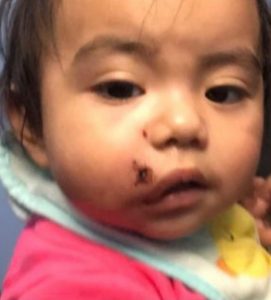
En la habitación donde se reunieron cada día ambientaron un altar consagrado a sus hermanos, con sus fotos, velas de Jesucristo, osos de felpa, y un pequeño recipiente donde la gente dejaba dinero para enviar los cuerpos sin vida a sus padres en Guatemala.
El tiroteo, aún sin resolver, dejó muertos a Faustino Ramírez, de 20, y a su hermana Martina Ramírez, de 19. La joven tenía un embarazo de ocho meses y su hijo por nacer también falleció. Por suerte, su pequeña hija de un año quien recibió un disparo en la cara, sobrevivió.
Pero los dolientes y la comunidad sintieron más que dolor por la pérdida de estos jóvenes, el sangriento asesinato expuso el temor que hace tiempo existe entre la población hispana de Canton que denuncia ser víctima de frecuentes robos y asaltos.
Quieren respuestas, que no han llegado.
Los jóvenes hermanos se independizaron
Los Ramírez eran menores de edad cuando entraron a Estados Unidos provenientes de San Marcos al oeste de Guatemala. “Allá trabajaban recogiendo café en las montañas que rodean su pueblo, aquí en Mississippi trabajaban en las plantas de pollos, y en construcción”, cuenta su tío Julio Moreno (nombre cambiado).

Faustino, el mayor de los hermanos Ramírez, a sus 15 años fue el primero en hacer la travesía desde Guatemala, atravesando México hasta llegar a Estados Unidos. “Faustino cruzó la frontera y fue a New Jersey donde vivió por cuatro años, solo hace un año viajó a Canton MS para reunirse con sus hermanos”, dice Moreno.
Martina, la segunda de los nueve hermanos Ramírez, llegó a la frontera de Estados Unidos proveniente de Guatemala en el 2017 cuando tenía 16 años y se entregó a los agentes de inmigración. Allí inició un proceso por asilo en el que Moreno, su tío, se hizo responsable de ella.
Moreno dió a los Ramírez un techo donde vivir, y trató de ayudarlos en todo lo que pudo pero no adivinó lo que les esperaba el día en que le anunciaron que iban a dejar su casa para independizarse.
“Dijeron que ellos ya eran mayores de edad, que ellos veían donde se iban a vivir”, recuerda el tío bastante afligido. “No significaba nada malo, por el contrario, se habían hecho mayores de edad, y querían hacerse responsables de ellos mismos”.
Poco tiempo después, los hermanos Ramírez se cambiaron a una casa situada a solo cinco minutos en carro desde la casa de su tío, en el centro de Canton. David, otro de los Ramírez, que hoy tiene 15, llegó para vivir con ellos y sobrevivió porque se escondió la noche de los asesinatos.
Una feliz reunión convertida en tragedia
Pasaron dos meses desde que los tres hermanos Ramírez arrendaron la casa de la calle Chestnut Ally en Canton. Parecía ser un reencuentro feliz después de varios años de estar separados. Esperaban tener una Navidad tan alegre como las que recordaban de Guatemala.
Pero estos días felices terminaron el pasado 29 de diciembre a la 1 de la mañana, cuando los hermanos Ramírez dormían plácidamente y un sujeto forzó la cerradura de su vivienda. Ingresó por la parte de atrás de la casa, sin que nadie lo notara, de acuerdo al relato de Moreno.
“El sujeto intentó abrir la primera habitación que encontró, donde estaban Faustino y David pero la halló asegurada así que siguió andando hasta el final del pasillo donde estaba la habitación de Martina”, dijo Moreno.
Al parecer Martina estaba bajo las cobijas abrazando a su hija de un año, cuando el sujeto invadió su habitación y les disparó sin piedad.
“Fueron dos disparos, uno a Martina y el otro a la niña. Faustino salió de su cuarto y en camino a la habitación de Martina se topó con el asesino quien también le disparó a muerte. En total fueron cuatro disparos los que se oyeron esa noche”, dijo el tío.
La menor sobrevivió y está con familiares
Los gritos de su hermana, Martina, alertaron a David de que algo terrible estaba ocurriendo dentro de su casa. Luego el estruendo de los disparos lo asustó tanto que corrió a esconderse en el armario de su habitación.
Desde su escondite oyó a un sujeto gritando y hablando, pero como David no habla inglés nunca supo qué fue lo que escuchó. El asesino tardó unos cinco minutos después de matar a los Ramírez hasta que abandonó la vivienda.
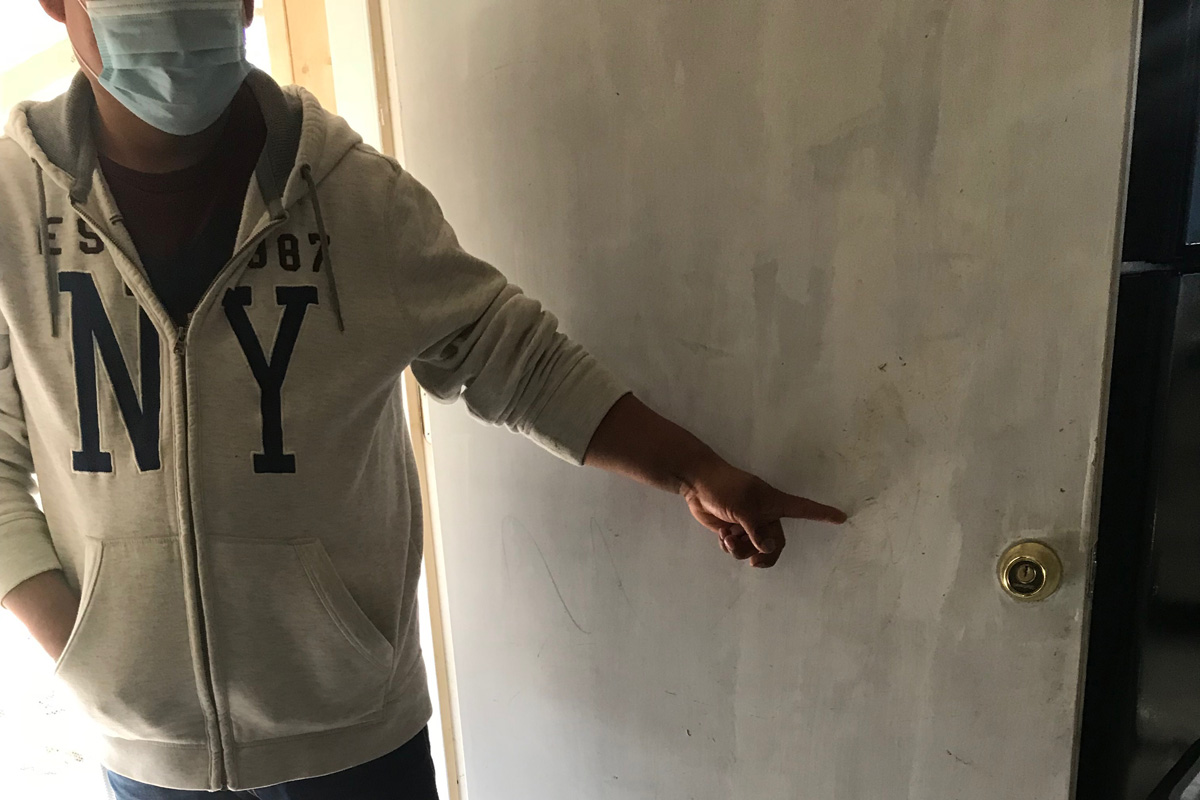
Cuando David salió de su escondite encontró los cuerpos de sus hermanos baleados y tendidos en el piso y la cama. La niña de un año que no ha aprendido a hablar todavía sobrevivió al ataque.
“La niña recibió un disparo en el cachete derecho y ahora está bajo el cuidado de familiares”, aseguró el jefe de la Policía de Canton, Otha Brown.
Amigos de las víctimas dicen que cuando David vio a la niña, ella no estaba ni siquiera llorando, sino impávida, mirando lo que le habían hecho a su madre.
Marcela Jiménez (nombre cambiado) vive en Canton y conoció a esta familia. Ella contó que la noche de la masacre y ante la imposibilidad de que David llamara al 911 o que se comunicara con alguien en inglés, el joven llamó a un familiar que hablaba su dialecto para que fuera a ayudarlo. “En cinco minutos éste llegó a la casa y entonces llamaron al 911”.
Familiares y conocidos de los Ramírez acudieron aterrados a la escena del crimen. Los policías y los forenses tomaron huellas, recogieron evidencia y se marcharon con los tres cuerpos sin vida.
Sobre los señalamientos hechos por algunos familiares de los difuntos acerca de una supuesta demora en la llegada de la Policía y la ambulancia al lugar de la matanza, Brown comentó que por ahora no puede hablar sobre estas denuncias.
Hispanos hablan de robos y agresiones
Esta masacre conmocionó a la comunidad hispana que se declara víctima de constantes robos y agresiones en Canton.
El padre Mike O’Brien de la Iglesia Católica del Sagrado Corazón en Canton le dijo a Mississippi Free Press que en los últimos dos años, los hispanos de su parroquia han sufrido tres o cuatro tiroteos. “Los hermanos Ramírez fueron asesinados, pero antes hubo otros latinos que salieron gravemente heridos al ser asaltados”, dijo.

Una vecina de la familia Ramírez, Karla Medina (nombre cambiado), explicó que hay diferentes niveles de víctimas entre los latinos. “Los más afectados son los guatemaltecos, porque son pequeños, indefensos y fáciles de intimidar. Algunos estadounidenses se burlan de ellos en su cara porque no entienden inglés. ¡Eso realmente me enoja!”
Medina recuerda muchas agresiones contra guatemaltecos que no fueron denunciadas porque la mayoría de estos hispanos son indocumentados y creen que pueden meterse en líos con las autoridades migratorias. “Otras veces, nada se logra reportando a las autoridades. Una vez unos jóvenes afroamericanos le dispararon a un adolescente guatemalteco en el abdomen durante un robo. El hispano sobrevivió, presentó la denuncia y nunca resolvieron nada ”, dijo Medina.
El tío de los Ramírez, quien también es de Guatemala, dice que hace poco unos hombres quisieron entrar en su casa pero cambiaron de idea porque el perro que tiene como mascota les ladró y los ahuyentó. “Yo estaba viendolos sin que ellos lo notaran. Eran tres hombres. Cuando el perro ladró dijeron ˆMierda! Tienen un perro grandeˆ y se fueron”.

Los robos en esta área del centro de Canton son frecuentes, según Moreno, quien incluso recuerda que la casa donde ocurrió el asesinato de sus sobrinos fue objeto de otro robo meses atrás, cuando otras personas eran los arrendatarios.
“Esa casa la han robado dos veces, la primera vez los ladrones entraron y se llevaron computadoras, tabletas, y televisores. Los que vivían ahí en esa época salieron un momento de la casa y cuando regresaron ya los ladrones se habían ido con todo. Esa vez no hirieron a nadie”.
El idioma es una barrera
Marcela Jiménez (nombre cambiado) vive en Canto y conoce muy bien a la población hispana de esta ciudad ya que es dueña de una agencia de empleo que ayuda a que muchos consigan trabajo.
Ella cuenta que la mayoría de los guatemaltecos llegaron a vivir a Canton por la cercanía del pueblo con las plantas de pollo donde trabajan muchos de ellos, y además porque el arriendo de las casas en este lugar es más barato que en otros sectores de Mississippi
“Una señora de Guatemala que vino aquí a buscar trabajo en días pasados me dijo que a ella le robaron el bolso un par de adolescentes cuando caminaba por la calle en el centro de Canton. Algunos guatemaltecos dicen que la Policía no los protege por su condición de ilegales”.
Mississippi Free Press le preguntó a la Policía de Canton su opinión sobre esta percepción de inseguridad por parte de la comunidad Hispana, pero la Policía no comentó nada al respecto
Jimenez señala que esa mala percepción también tiene que ver con malentendidos entre los policías y lo Latinos que se dan por culpa del idioma.
“Muchas veces los hispanos no pueden comunicarse con los policías porque no hablan el suficiente inglés. Para solucionar eso sería muy bueno que trajeran policías que hablen español”, dice Jiménez.
Acerca de esta mala percepción de seguridad, el padre O’Brien dijo que hace unos días se conformó un grupo de personas que están tratando de encontrar una manera de hacer que los hispanos de Canton vivan más seguros. Este grupo está formado por autoridades locales, latinos y su parroquia
Faustino se iba a New Jersey
Jiménez recuerda que los Ramírez eran personas respetuosas y discretas. Dice que así son casi todos los guatemaltecos que viven en Canton. “Faustino quería volver a New Jersey así que pocos días antes de ser asesinado había renunciado a su trabajo en construcción para seguir sus sueños. Supongo que tenía dinero para hacer su viaje y el asesino lo sabía”, comenta.
Brown señaló que la noche del homicidio, también se cometió un robo. “Estamos tratando de descubrir la verdadera razón de estos crímenes, pero sí se cometió un robo la noche de los asesinatos… No sé cuánto fue hurtado, pero sí hubo un robo”. La versión de la familia Ramírez es que esa noche Faustino tenía entre $2.000 y $3.000 en la casa.
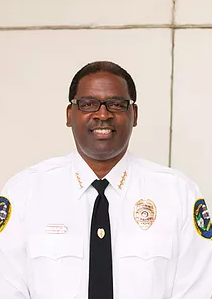
Tal vez esta terrible tragedia se hubiera podido evitar si Faustino hubiera guardado su dinero en un banco, pero para algunos guatemaltecos ir al banco es una actividad extraña. La mayoría de indocumentados provienen de familias pobres que no usan el banco, pues nunca tienen dinero para ahorrar.
“No es faćil que la gente de Guatemala se acostumbre a abrir cuentas de ahorros porque allá en sus países el dinero que hacen solo les alcanza para sus deberes diarios, y cuando llegan a Estados Unidos aunque ganan más dinero muchos siguen sin ir a los bancos”.
Moreno sí tiene cuenta bancaria y le aconseja a todos sus compatriotas abrir una. “En algunos bancos, los guatemaltecos solo necesitan mostrar su pasaporte para que les aprueben cuentas de ahorro. Así sean ilegales, es muy fácil”.
Brown le dijo a MFP que sus esfuerzos están encaminados a atrapar al asesino, para lo cual, entre otras cosas, está recolectando testimonios con los vecinos de los Ramírez, y trabajando con la ayuda del Sheriff de Madison.
Los restos mortales de los Ramírez van a Guatemala
Mientras continúa la investigación, los familiares de los hermanos Ramírez están tratando de ponerle fin a este horrendo capítulo. Antes de que pudieran empezar la novena en la casa donde tuvo lugar esta matanza, recuerdan que primero tuvieron que limpiar todo lo que dejó el asesino a su paso.

“Después de que hicieron su trabajo, la policía nos dijo que podíamos quedarnos en la casa si queríamos”, dijo Moreno. “Nadie quería, pero antes de irnos limpiamos la sangre y arreglamos todo para empezar a rezar al día siguiente por los sobrinos”.
Ahora, la prioridad es enviar los restos mortales a sus familiares en Guatemala. “Los padres de Ramírez quieren ver los cuerpos de sus hijos”, dijo Moreno. “Lo que queremos es enviarlos de regreso a Guatemala. Por eso recaudamos dinero durante las novenas y también en Gofundme.com ”.
Otros como el padre O’Brien también se acercaron para ayudar. El sacerdote abrió una cuenta en Trustmark Bank donde ya anunció que recibió las donaciones necesarias para enviar los cuerpos de Martina y Faustino a casa.
“Tuvimos el funeral hace pocos días en nuestra iglesia para los dos adultos y el nonato. Sus cuerpos serán enviados a Guatemala”, dijo el padre O’Brien. “Hubo mucha ayuda de todo Mississippi y otros lugares en los Estados Unidos. Personas de nuestras comunidades angloamericanas, afroamericanas e hispanas ayudaron, y también tuvimos ayuda de otras iglesias”.

